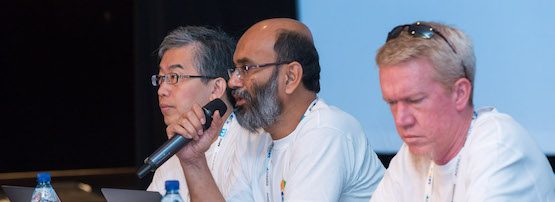
The Open Policy Meeting at APRICOT 2019 / APNIC 47 will be held on 27 February 2019 in Daejeon, South Korea, with five policy proposals up for discussion.
Here is a snapshot of these five proposals.
Under discussion from APNIC 46
prop-124-v005: Clarification on IPv6 Sub-Assignments
This proposal clarifies the definition of assigned address space for IPv6 delegations under section 2.2.3 of the APNIC Internet Number Resource Policies document.
When the policy was drafted, the concept of assignments/sub-assignments did not consider the use of IP addresses in hotspots, or the use of IP addresses by guests or employees in Bring Your Own Device (BYOD) and many other similar cases.
This proposal clarifies the situation in this regard and better defines the concept, particularly considering new uses of IPv6 (RFC 8273), by means of additional language added to the definition of an assignment.
prop-126-v003: PDP Update
This proposal suggests updates to section 4 of the APNIC Policy Development Process (PDP) document.
This proposal would allow increased participation, by also considering the comments in the list for the consensus determination. So, consensus would be determined by balancing the mailing list and forum discussions, thereby increasing community participation.
It also suggests to:
- Remove the ‘double’ consensus required in Policy SIG and APNIC Member Meeting.
- Amend the consensus definition from ‘general consensus’ to ‘rough consensus’.
- Circulate on the SIG mailing list if the proposals reach consensus at the OPM.
- Implement automatic expiration of old proposals if a new version is not submitted.
- Introduce an ‘appeals’ process directly to the APNIC Executive Council if the proposer considers the SIG Chairs have violated the PDP.
New proposals
prop-127: Change maximum delegation size of 103/8 IPv4 address pool to a /23
The current maximum delegation size from the final APNIC IPv4 block, 103/8, is a /22. This proposal seeks to reduce this maximum delegation size to a /23. The objectives are to:
- Save IPv4 addresses for newcomers.
- Prolong the exhaustion of 103/8 address space.
- Encourage IPv6 deployment.
There is no mention of changing the minimum delegation size, which is currently a /24.
prop-128: Multihoming not required for ASN
When the ASN assignment policy was originally proposed, the reliability of networks was not as good then as it is today. At that time, it made sense to ensure an ASN holder was multihomed. With the latest developments in network interconnections, it is not required to be multihomed. This proposal is amending to multihome in the future with the need to interconnect with other Autonomous Systems.
prop-129: Abolish waiting list for unmet IPv4 requests
The current APNIC IPv4 policy allows each APNIC account holder to receive up to a /22 from the IPv4 Recovered Pool after they have received a /22 from the Final /8 pool (103/8). However, the Recovered Pool may not always have enough resources for delegation, therefore a waiting list was created.
This proposal suggests abolishing the current waiting list. Once APNIC receives recovered IPv4 address space from IANA or through closures or returns and so forth, it should be treated under the same policy as the Final /8 (103/8).
The proposal also suggests creating a waiting list once APNIC runs out of resources in the last /8, with the same last /8 allocation policy applied to this new waiting list.
SIG elections
APNIC will hold Chair elections at APNIC 47 for the Policy SIG, NIR SIG, and Cooperation SIG. The current Chair term for all three SIGs ends at APNIC 47.
The election will be first agenda item of these SIG sessions.
You can make a nomination using the online form. Nominations are open until 23:59 (UTC +10) Wednesday, 20 February 2019.
Participate! Have your say
Good policy relies on a range of opinions. Other people in the community want to hear from you! Have your say about these policy proposals by subscribing to the Policy SIG Mailing List or participating in person or remotely during the APNIC 47 Policy SIG meeting.
The views expressed by the authors of this blog are their own and do not necessarily reflect the views of APNIC. Please note a Code of Conduct applies to this blog.
